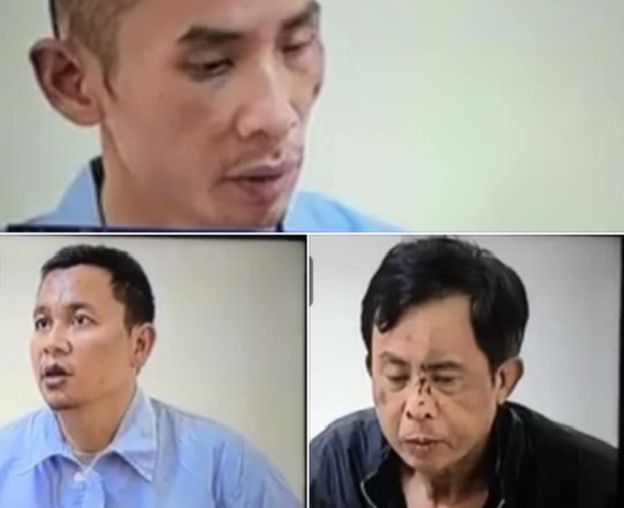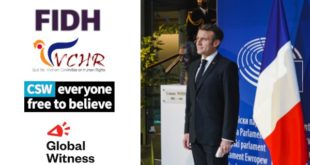PARIS, 15 janvier 2020 (VCHR) – M. Võ Văn Ái, Président du Comité Vietnam pour la Défense des Droits de l’Homme (VCHR), a envoyé aujourd’hui une lettre aux membres du Parlement Européen pour les informer des violents affrontements au sujet de l’accaparement des terres qui ont eu lieu la semaine dernière dans la commune de Đồng Tâm, où un homme de 84 ans a été tué par la police et où trois policiers ont trouvé la mort. Ces incidents surviennent alors que les députés européens entament les dernières discussions sur l’Accord de Libre-échange UE-Vietnam (EVFTA) et l’Accord sur la Protection des Investissements (IPA). Ces accords ont été signés l’an dernier et leur ratification doit être autorisée par le Parlement Européen (PE).
« La question des droits à la terre est une cause majeure des violations des droits de l’Homme au Vietnam. Le PE ne devrait pas ratifier l’EVFTA et l’IPA tant que le Vietnam n’aura pas mené une enquête impartiale et transparente sur l’attaque de Đồng Tâm, c’est à dire avec la participation d’observateurs indépendants internationaux », a-t-il dit. « Ignorer les graves problèmes de droits de l’Homme à ce stade crucial pour les relations UE-Vietnam ne serait pas seulement un déshonneur pour l’UE mais contribuerait aussi au renforcement d’un régime qui réprime les libertés et les aspirations démocratiques de son peuple ».
Dans sa lettre, M. Ái a pressé les députés européens d’insister sur le fait que le Vietnam doit s’engager à une série de mesures cruciales avant qu’ils ne consentent à ratifier l’EVFTA et l’IPA, comme la libération du journaliste indépendant Phạm Chí Dũng et des autres prisonniers politiques, ou encore la révision du Code pénal vietnamien qui criminalise l’expression libre et la dissidence sous prétexte de « sécurité nationale ». Ci-dessous, la lettre envoyée au PE (en anglais) :
Deadly Land Clashes in Hanoi Suburb:
Appeal to the European Parliament
Appeal to the European Parliament
Dear Member of the European Parliament,
As you prepare to vote on the ratification of the EU-Vietnam Free Trade Agreement (EVFTA) and Investment Protection Agreement (IPA), we write to draw your urgent attention to the eruption of unprecedentedly violent clashes in Vietnam over land rights, which have left at least one civilian and three Policemen dead.
The clash took place on 9th January 2020 in the commune of Đồng Tâm, 40km south of Hanoi. According to media reports, at 4:00am, thousands of Police stormed the village with tear gas, explosives, grenades and pepper spray, forcefully reclaimed a plot of 59 hectares of land and began to build a wall around it. The farmers resisted, throwing grenades and petrol bombs. Police then broke into the home of Lê Định Kình, an 84-year-old village elder and community leader, arrested his grandchildren, two sons and daughter-in-law, destroyed his home with explosive charges and shot Mr. Kình four times. Local authorities confiscated the body, then returned it to the family the next day. A video filmed by his daughter and posted on Facebook shows traces of beatings on Mr. Kình’s body, a broken leg and bullet marks near his heart.
The authorities intend to bring heavy sentences on Đồng Tâm residents to avenge the deaths of the three policemen, although the circumstances of their deaths remain unclear. The Hanoi Police Department has announced that 20 villagers stand accused of murder, which carries the death penalty. The three Policemen were promoted and posthumously awarded Vietnam’s highest Medal of Merit for “outstanding service”. No mention has been made of punishments for the murder of Lê Đình Kình.
On 12th January, Facebooker Chung Hoàng Chương was arrested for posting news on Đồng Tâm on his Facebook “Lucky Chương”. He is accused of “undermining the prestige of state agencies” and charged with “abusing democratic freedoms to encroach on the interests of the state” (article 331 of the Criminal Code). Radio Free Asia’s YouTube account was temporarily suspended on the government’s demand, but restored after RFA filed a formal complaint. On 13th January, the State-controlled television channel VTV1 aired “confessions” of Mr. Kình’s son and two grandsons admitting that they had attacked the police with stones and hand-made petrol bombs. Their faces were bruised as if they had suffered torture. Mr. Kinh’s wife told Hanoi-based activists that she had also been kicked and beaten by Police to admit storing hand grenades, but could not do so because she did not know what a hand grenade looked like. Lawyer Luân Lê wrote on his Facebook that the confessions on TV violated Vietnam’s Criminal Procedures Code which guarantees the right to presumption of innocence.
The conflict in Đồng Tâm has been simmering for several years. A plot of land was originally earmarked for the Vietnam People’s Army (VPA) in the 1980s for the Miếu Môn military airfield which was never built. Tensions came to a head in 2017 when the government seized more farmland for the Viettel Telecommunications Group, also owned by the VPA, without adequately compensating them. Villagers said that their families had tilled the land for generations and paid taxes to the government. They kidnapped 38 police and local officials and held them hostage, releasing them after the Mayor of Hanoi personally promised to settle the dispute peacefully and take no legal action. In June 2017, however, the Mayor went back on his promise and stepped up harassment against the villagers. During the recent clash, Đồng Tâm residents said they would “fight to the death” to defend their rights. The events in Đồng Tâm and the European Parliament’s ongoing deliberations on EVFTA are inextricably linked, for land disputes are a major source of human rights abuses in Vietnam. Under the 2013 Land Law, the land “belongs to the people, but is managed by the state”. Private land ownership is not recognised by the authorities, and compensation is decided by local officials. As a result, arbitrary confiscation of lands for economic projects, official power abuse and corruption, forced displacements and inadequate compensation are widespread, resulting in deep popular frustration and discontent. Buddhist temples, Catholic and Protestant Churches and cultural sites have been seized with little warning and scarce compensation. Those who complain risk lengthy prison sentences under vaguely-defined “national security” provisions in the Criminal Code.

The suppression of the Đồng Tâm protest is not an isolated event. The government is currently engaged in a nationwide crackdown on freedom of expression, arresting bloggers, human rights defenders, advocates of environmental and worker rights simply for their dissenting views. In a video message to the European Parliament sent to our Committee in November 2019, journalist Phạm Chí Dũng warned that more activists would be arrested once EVFTA was signed. Two days later, he was arrested himself, and faces up to 20 years in prison.
We call upon the European Parliament to insist that Vietnam undertakes an immediate and impartial inquiry into the events of Đồng Tâm with the participation of international observers, including diplomats, journalists and UN officials who should have unfettered access to the area to assess events and monitor the government’s investigations.
We also urge you not to ratify EVFTA and IPA as they stand. The European Parliament should postpone its consent to ratification of EVFTA and IPA until:
- Vietnam investigates the Đồng Tâm violence and commits to other crucial reforms, including amending the Criminal Code to bring it into line with international standards and releasing independent journalist Phạm Chí Dũng and all others detained for the mere exercise of their legitimate rights to freedom of expression;
- Effective monitoring and complaints mechanisms are included in EVFTA to ensure that human rights are protected and vulnerable populations do not suffer negative impacts of the agreements.
To overlook these serious human rights concerns at this crucial stage of EU-Vietnam relations would not only dishonour the EU, but also contribute to entrenching a regime which suppresses the liberties and democratic aspirations of its people.
Yours sincerely,
Vo Van Ai
President, Vietnam Committee on Human Rights
This post is also available in:
 Quê Me Quê Me: Action for democracy in Vietnam & Vietnam Committee on Human Rights
Quê Me Quê Me: Action for democracy in Vietnam & Vietnam Committee on Human Rights



